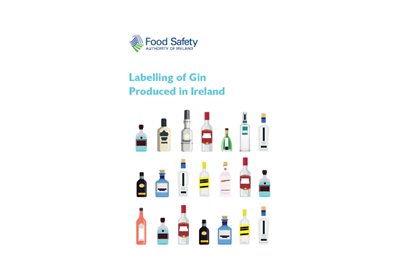Thursday, 18 June 2020
New guidance published on marketing terms used to advertise or promote gin and gin products produced in Ireland.
The Food Safety Authority of Ireland (FSAI) today published new guidance on marketing terms used to advertise or promote gin and gin products. The Labelling of Gin Produced in Ireland outlines what is required to ensure that gin produced in Ireland is labelled correctly, in line with legislative requirements. The guidance was developed to provide greater clarity for the industry to ensure that products are not mislabelled or marketed in such a way as to mislead consumers. The FSAI has similar guidance for the labelling of Irish whiskey. This is part of the FSAI’s role in providing advice to food businesses regarding food law compliance, in order to safeguard consumers’ health and interests.
According to Dr Pamela Byrne, Chief Executive, FSAI, this new guidance was produced to ensure that the industry clearly understands its legal responsibility and complies with the EU regulations governing their labelling.
“The gin guidance encompasses everything from the use of place names in sales terms; to the listing of allergen information; to the packaging material used and it is hoped that it will help producers in complying with the regulations. While gin is defined in the legislation as a ‘juniper-flavoured’ spirit drink produced by flavouring ethyl alcohol of agricultural origin with juniper berries, a ‘juniper flavoured spirit drink’ is a separate spirit drink, which is produced by flavouring ethyl alcohol of agricultural origin or grain spirit or grain distillate or a combination thereof with juniper berries. The minimum alcoholic strength by volume of a juniper-flavoured spirit drink is 30%, while the minimum alcoholic strength of a gin is 37.5%. Therefore, it is important to remember that these ‘juniper-flavoured spirit drinks’ cannot be labelled as ‘gin’. Similarly, the use of the word ‘distilled’ must be used carefully as prescribed in the guidance, as must geographical descriptors,” said Dr Byrne.
“The size of the gin industry in Ireland has expanded exponentially in recent years, with more than 30% growth in sales in some years and around 50 brands are produced in Ireland. While it is natural that marketing specialists will use every means at their disposal to gain a competitive edge over their rivals, this must not be achieved at the expense of consumers’ trust. Food law is in place to ensure that consumers are not misled by any claims on food or drinks. We hope that our guidance will assist the industry to comply with the complex legislation in this area, so that consumers can be confident that the gin produced in Ireland is accurately and truthfully described on the label or in associated marketing materials,” concludes Dr Byrne.
The Labelling of Gin and Gin Products in Ireland

